Posthole Digger
Never did I think a posthole digger would mean so much to me, that a morning spent digging holes would bring me to grateful and joyous tears--though I am often brought to tears these days.
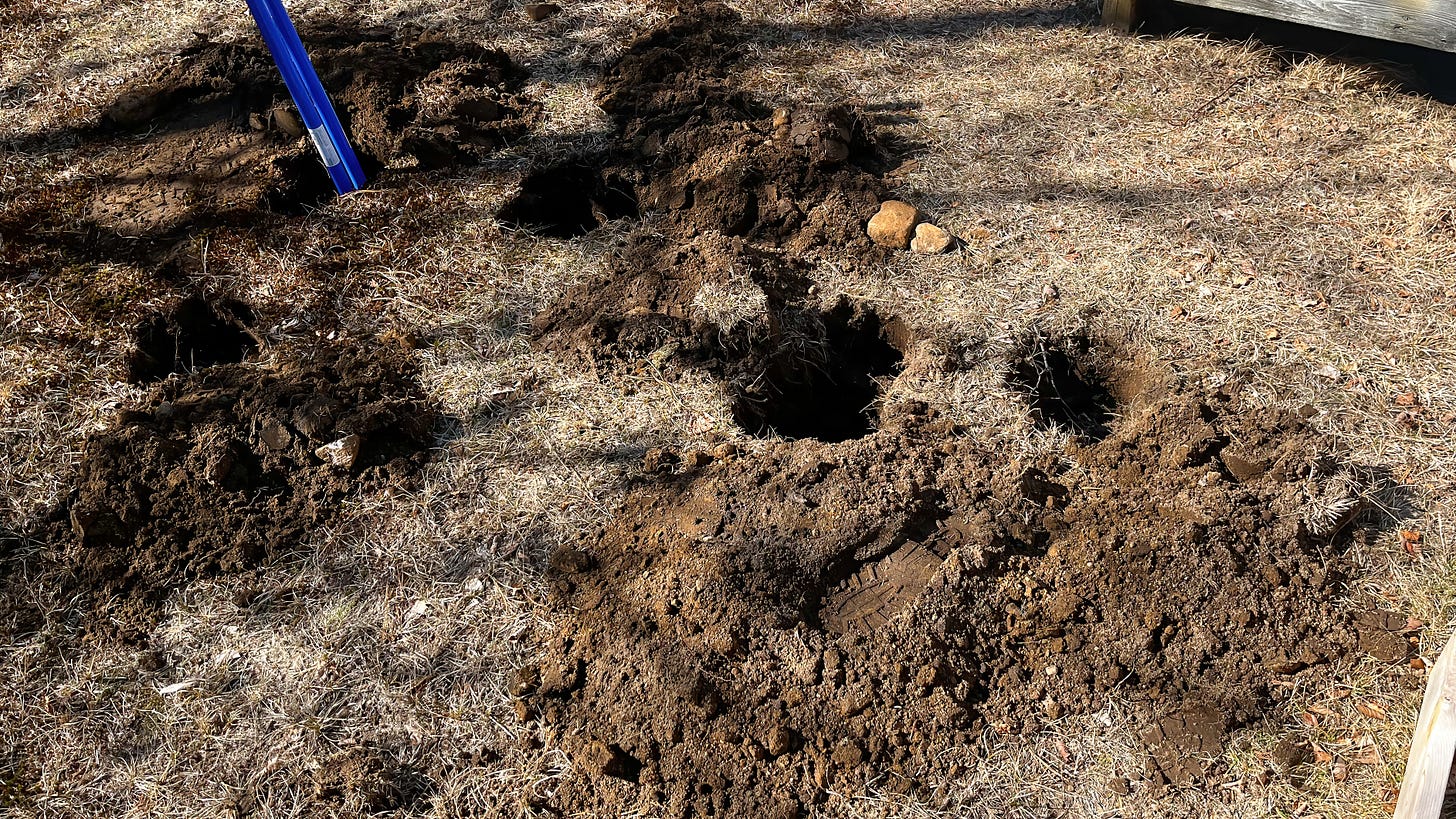
A year ago—I’m writing on March 16—I was one day from being discharged after two months of inpatient hospitalization due to a traumatic brain injury.
Going up stairs would be maybe out of reach, I was told. In the hospital, I had to stay strapped into a wheelchair to prevent me trying to stand up—which I had a habit of doing. The wheelchair’s seatbelt would set off an alarm if I undid it. To walk, I was put into a harness that hung from a track on the ceiling. I was sent home with a cane.
Now, I walk sans apparatus. Never used the cane. To prove to myself that I can walk, some days I walk farther than I need to. I’ve been doing the work to recover as quickly and as best I can. The work isn’t done, but still, I am extremely lucky to be recovered as I am—never take it for granted. Nearly everything I used to do is doable again; doable, but different, difficult.
This morning, I dug postholes.
There’s no fence to be put in; the holes will never see posts. I just wanted to dig them to see that I could.
When my outpatient physical therapist—who helped immeasurably—asked in June of last year what my recovery goal was, I said with imperfect speech: “To be able to use a posthole digger again, to feel good with one.” As best I could, I mimed the motion of digging a posthole. This morning, I met that goal.
There’s a different morning this tool reminds me of. Putting in some split rail fencing. I remember the satisfaction of thrusting the tool into the dirt. Pulling the handles apart to bring the blades together, bringing up a pile of earth. A satisfaction I felt again this morning.
Returning to that split rail after my TBI, a few weeks after discharge, I was proud—but also tormented. When will I be able to dig postholes again? If I become able?
A posthole digger can be credited with bringing about two great mornings of my life. That morning and this one—March 16. I wrote recently about joy. A posthole digger brought me joy today. I was able again to use one.
As motivation while digging, I kept replaying a moment in my head. Fishing with somebody I respect, he asked: “Can you do what you used to?”
Those words have haunted me. It’s a hard pill to swallow, that this injury has birthed rightful uncertainty regarding my capabilities.
What I used to. That’s what I spend my days trying to do. The goal is to make what I used to synonymous with what I still do. Be it fly tying or digging postholes.
Much time since the accident has been spent looking for an enemy—somebody to hold accountable for all of this. That’s how my mind sometimes worked before my injury, a way it defaults to now: I want an enemy. Somebody to blame, to prove wrong.
It wasn’t always this way. There are things I’m proud to have done without an animate enemy—weightlifting PRs, things I’ve written. With weightlifting there was no enemy, just a heavy barbell to move. With writing, the goal was never to prove anybody wrong, but to talk to the right people, read the right things, gain fluency in a topic, fit the necessary information within the word count.
With my TBI there isn’t an enemy either. There’s no person to blame. It was an accident. Still, you could argue an enemy has been under my nose the whole time, something to prove wrong. The injury itself, its symptoms. I can dig a hole or tie a passable fly to metaphorically flip it off, trounce its symptoms and show I’ll still do things I used to.
Digging a posthole is a version of me telling my TBI to fuck itself, of proving it wrong. Therefore, a posthole digger brings me joy. As does starting a long-stagnant weed whacker to make sure I still can—which I did today.
“Back in the Saddle” was on repeat in my Worktunes headphones. When Steven Tyler shouts “I’m back!” that cornily brought me to tears. It’s how I felt digging a posthole, yanking the pull start on a Husqvarna 525L.
Before I was discharged, I didn’t believe I’d get to be somewhere besides a hospital room. Now the hospital is in the past.
When the hospital was my present and my brain was still acting up, it fabricated an encounter with a hospital employee. In that false encounter, an employee told me I’d probably stay in the hospital for 15 years. Treating that as reality, I tried to come to terms with the fact that, comfortably into my 40s, I’d still be drinking Ensures and pressing the call button when I had to go to the bathroom.
It took me longer than I care to admit to realize that didn’t actually happen. It had a hold on me for some time. I would continue telling the story, insisting it had happened. It felt real to me.
Until I was out of the hospital, I couldn’t imagine a life without a wheelchair—replied “allegedly” whenever anybody brought up the fact that I was going to be sent home. “Allegedly” became my default retort to any positive, injury-related remarks. There was a fear—one I still deal with—that anything good would be taken away. The evidence indicates that good things haven’t always been taken away from me, and I am trying to remind myself of that, proceed accordingly.
Aside from “Back in the Saddle,” a song I listened to while I dug postholes was by Fred Eaglesmith, with some lyrics:
She tells all our friends that I've got my PhD
But it stands for posthole digger
It ain't exactly a degree
There was a point in time where a PhD was a potential next step for me. I remember emailing old professors about my unsure plans, pacing while I talked to one over the phone. After graduate school, I still entertained the option. It almost felt more realistic.
The main PhD in my life now is a posthole digger, and I love it. I’m thrilled to have the degrees I’ve earned, thrilled to know and understand what I do. But having survived what I have, a high priority for me is to do what brings me joy. If a PhD brings me joy, and “it ain’t exactly a degree,” then I should dig postholes and be happy.
I still get to live, so I should make my life feel good. I’ll still edit, write, do anything engaged with the written word and ideas—but I also want to dig postholes.
I started this on March 16, but now I am finishing it on March 17. It’s supposed to be a warm day for New England in March.
I could easily pass hours at my laptop—writing, editing, reading—or with a copy of Gogol’s stories or Bernd Heinrich’s essays. Instead, I will go for a long walk to an Osprey pole. I read that some are back already on Cape Cod—a pair had to take their nest back from some eagles. I want to see if any Ospreys have returned to the nest close by. Plus, I heard my first Red-winged Blackbird of 2023 on my walk yesterday, and will walk today by a place I usually see them—to hopefully see my first Red-winged Blackbird of 2023. Not just hear one.
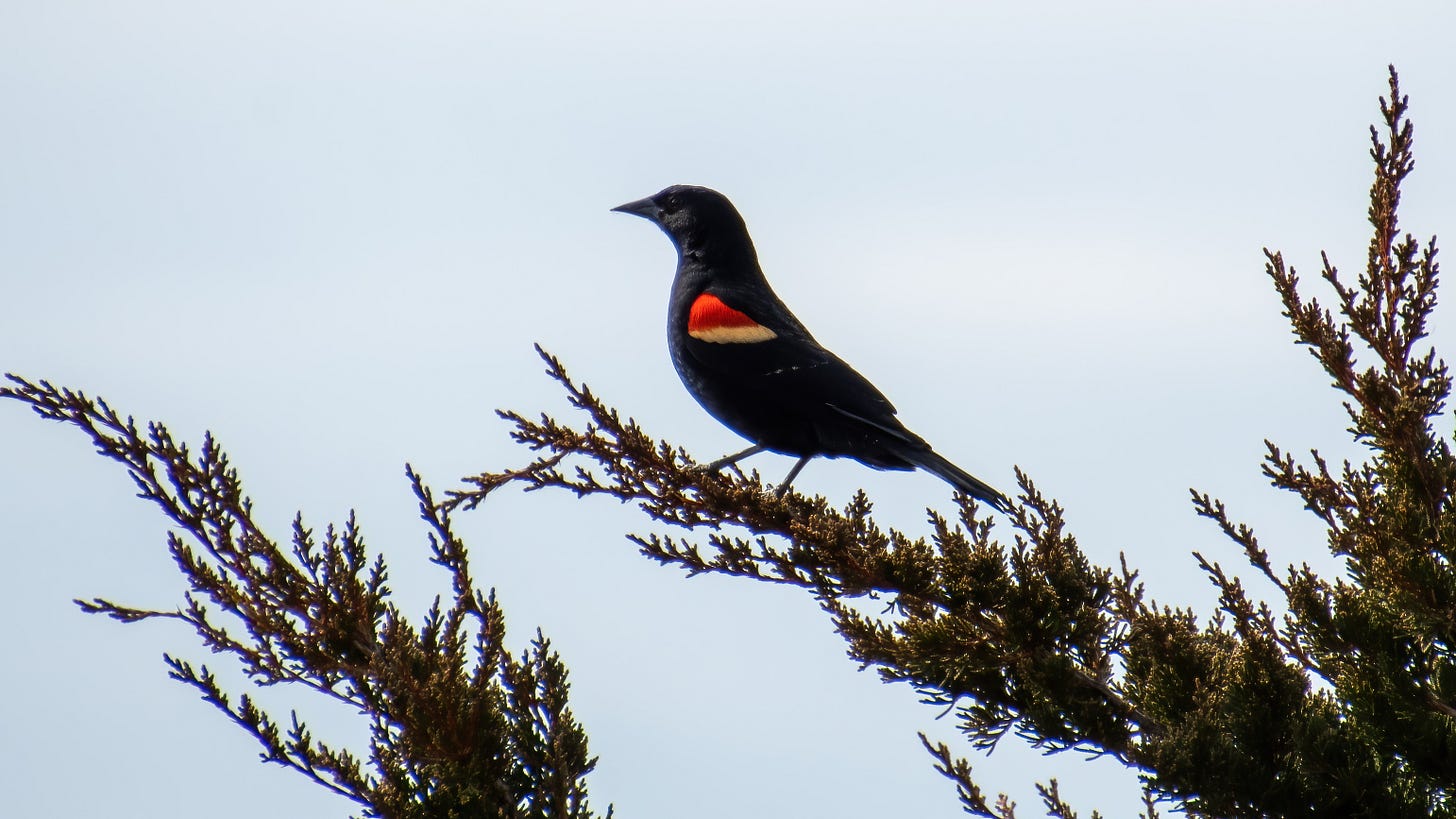
Then, I will dig some postholes. The yard is unsightly from all the digging, but a turned up yard is a small price to pay to feel good.
From there, I plan to go to a conservation property to find birds. I’d love to see an Eastern Meadowlark. I’ve seen them there before. It’s a long shot, but it can’t hurt to look for one.
A key element of that plan for the day is the postholes. Again, there’s no fence that needs to go in; but for other reasons, there are holes that demand to be dug.





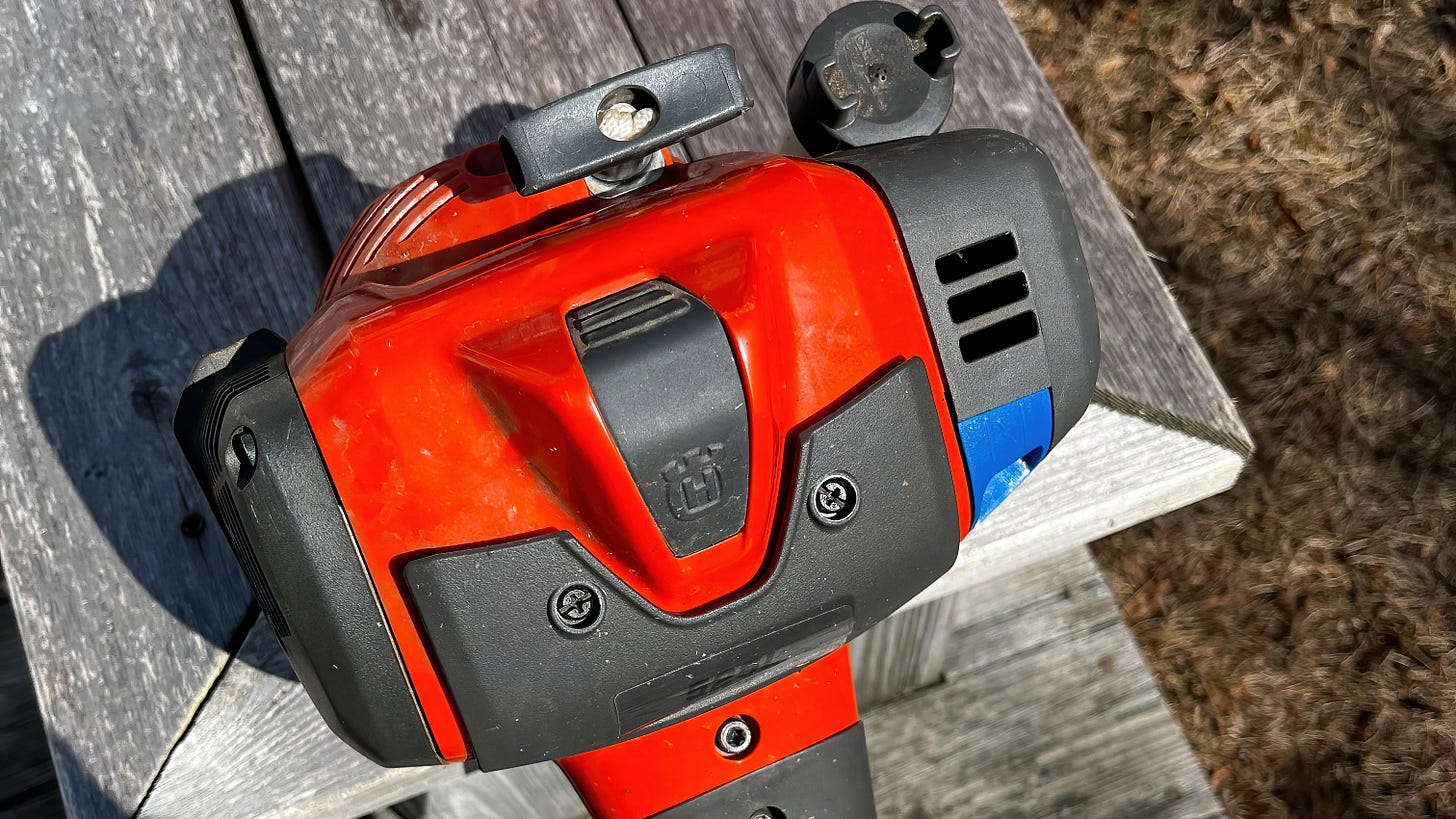
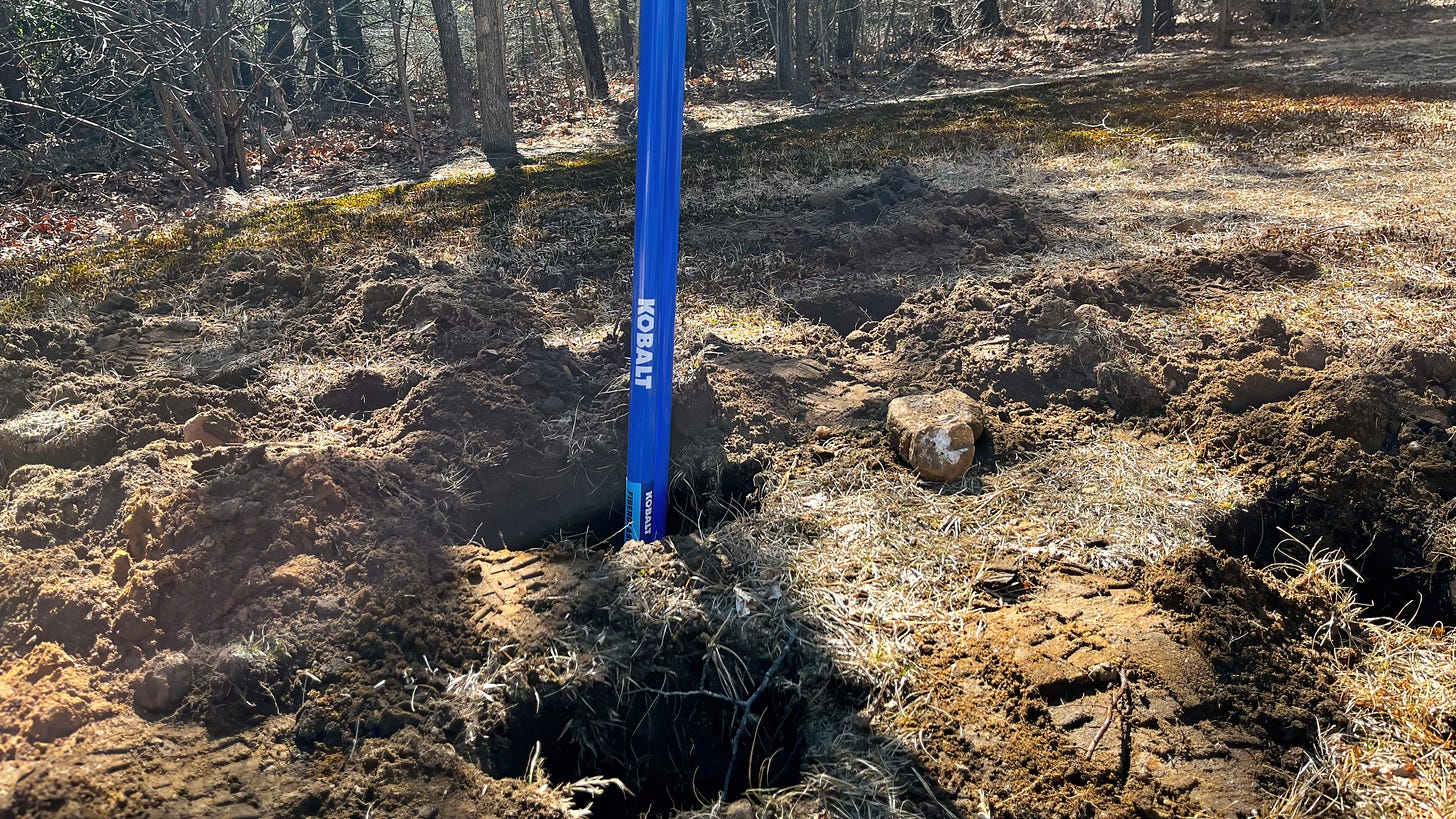
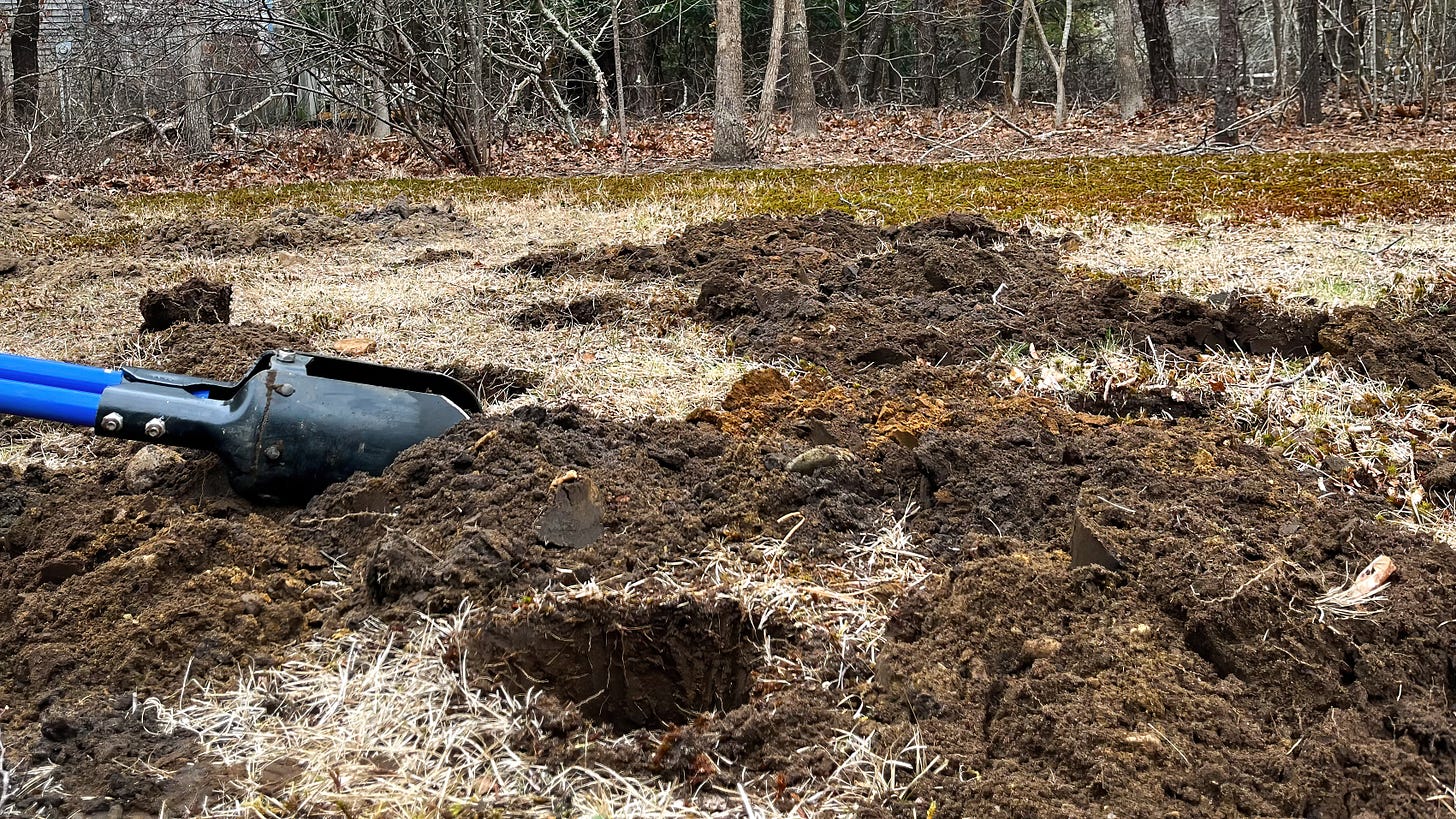
Beautiful and inspiring piece! Thank you for sharing such a personal journey.
Two years feels both so recent and so long ago..your persistence and battle for returned strength are remarkable James. Thank you for sharing this one.
Not everyone will agree, but I believe that being able to cry is a gift, and a sign that points the way towards an enormous heart.